
|
January
10,
2015
-
No.
2 Opposition
to Capital-Centred Political Economy Human-Centred Political Economy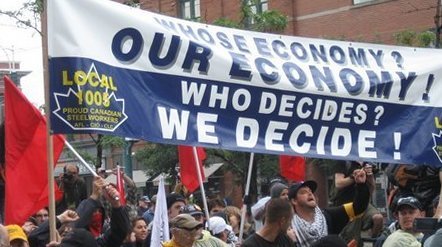 • How Does the Issue of Inequality Pose Itself? • Why All the Fuss over Piketty's Book on Political Economy? - K.C. Adams - In the News France • Descent into Unprecedented State of Anarchy and Violence - Pauline Easton - • Rabid Demonization of Popular Resistance as "Terrorism" - Nathan Freeman - • The Real Implications for People and Their Rights After Attack on Charlie Hebdo - Anne Jamieson - • A False Flag Operation? Fifth Anniversary of Devastating Earthquake in Haiti • Haitians Step Up Their Fight for Independence and Democracy Steadfast Defender of Puerto Rico's Right to Independence • Worldwide Campaign for Liberation of U.S. Political Prisoner Oscar López Rivera • Oscar López Rivera, Puerto Rican Independence Fighter Opposition to Capital-Centred Political Economy Human-Centred Political Economy
Capital-centred political economy hypothesizes instruments of production such as buildings and machines as fixed capital, and material wholly consumed in the production process as circulating capital. This hypothesis is necessary to distort the social consciousness of the working class and middle strata. The hypothesis places means of production as capital to instil in the brains of workers and intellectuals the notion that capital is the driving and necessary force in the creation of modern means of production and the production of all goods and services. Without capital no modern production would occur is the story workers are told endlessly. This hypothesis is a fraud. Means of production are the product of the work-time of those human beings who make them. Capital is a social relation that enslaves the actual producers, the working class, to owners of capital. The working class in the social relation is the actual producer of goods and services including means of production but does not own or control what it produces. Means of production of pre-capitalist economic formations were the products of the actual producers of those systems back to communal and pre-class times. Capital was not necessary at those times to produce means of production and is not needed in contemporary times, which is the time of the working class. Owners of capital were only necessary as a social force to move society out of feudal petty scattered production and introduce the generalized use of science and technology to production. Once the move was complete their existence as a social class became unnecessary. The time when they became obsolete has long passed. The working class is the social force now necessary to complete the transition from petty scattered production to industrial mass integrated production on a global scale governed with new relations of production in harmony with the socialized economy.
Imperialist propaganda now often refers to fixed capital as costs. This degeneration reflects the wrecking, retrogression, parasitism, decay and war that have become constant features of the imperialist economy. Imperialist theory reflects the degeneration in the economic base and the imperialist politics, which is fighting to retain the transitional form of capitalism against its necessary transformation to the new.
The use of capital-centred or imperialist terms serves to block the adoption of the terms, expressions and theory of human-centred political economy. It is a form of promoting anti-consciousness. The working class movement cannot afford to cling to capital-centred and imperialist theory, terms and expressions. Rather, it must participate in developing new theory suitable for the twenty-first century and a mature working class, a social class ready and poised to lead the world forward to socialism, the emancipation of the working class, and the elimination of social classes and class society. How Does the Issue of Inequality Pose Itself?There is a lot of talk nowadays about creating a just society by addressing income inequality or inequality of opportunity. All of it serves to cover up that so long as the aim of society is to pay the rich, make the most powerful monopolies competitive on global markets and push a vicious neo-liberal anti-social offensive to eliminate all traces of a public authority in favour of monopoly right, the rich will get richer and the poor poorer. Obscene wealth is accumulating at one pole while the ranks of the poor increase, including the percentage of people in abject poverty. Far from addressing inequality, it has become enshrined. First, it is important to take note of what is meant when speaking of inequality. Inequality is both natural and social. Inequality stems from the vast variety of natural abilities of individuals, and the class privilege that permeates the capitalist social system and its division between the working class and owners of accumulated social wealth. Natural inequality is related to natural ability. Social inequality is related to social class privilege either inherited through hereditary right or acquired through natural right.
Myriad statistical studies reveal that class status has a profound effect on natural ability and whether it blossoms or withers and dies. Social inequality negates the broad development of individual ability, which for many individuals is lost to them, the general interests of society and the public good. The working class and its political representatives reject this waste and fight for the rights of all and their empowerment. People have rights by virtue of being human; fundamental to this is the right of each and all to contribute to society to the best of their abilities and in return have society in a harmonious way guarantee their rights and needs. When members of the working class with natural ability or for other reasons break through the glass ceiling of class privilege so to speak, such as President Obama, they are encouraged through wealth and status to join the ruling capitalist elite ideologically and politically, and use their new-found class privilege to consolidate their positions and that of other members of the ruling class in opposition to the working class. The negation of social inequality for selected individuals of the working class paradoxically strengthens and consolidates social inequality within society as a whole. It nurtures a section of working people dedicated to their new-found class privilege, who use their own acquired substantial resources and influence and the power of the state to deprive the collective of humanity from exercising its right to be according to everyone's abilities and needs, and the interests of society. Members of this section become ideologues for social inequality and class privilege, as they, through natural right have negated their own individual social inequality and gained the "American" or "Canadian" dream, and now trumpet their new-found class privilege with fanatical zeal. The leader of the federal Liberal Party, Justin Trudeau, who inherited his social class privilege, is quoted in the Huffington Post saying: "The greatest of these principles [of the Liberal Party] is equality of opportunity. It is key to all the others. To be successful, we Liberals need to be the voice for the millions of Canadians who share this belief, who believe that in a fair society, hard work should pay off. [...] "Leadership is about setting priorities based on
principle. I believe that there is no more important principle than
equality of opportunity -- and the progress it generates -- for
individual Canadians, and for Canada." Trudeau wants to change inequality of opportunity so
that certain individuals through natural right can join Canadians like
himself who have either inherited positions of power and class
privilege through hereditary right or acquired their positions, wealth
and power through natural right. Trudeau says inequality of opportunity
negates the possibility of people, especially those who are hard
working and possess ability, fulfilling their dream of upward mobility
to either professional status with high incomes or becoming owners of
accumulated social wealth and leaving behind the working class not only
in class position but also importantly in thinking, outlook, ideology
and politics. According to Trudeau, unfair inequality of opportunity causes yet more inequality and loss of hope in the Canadian dream of acquiring social wealth and class privilege. The solution is "equality of opportunity" or "intergenerational mobility" to strengthen the status quo of class privilege and collective inequality through keeping alive the dream of negating social inequality for those who work hard or who in a banal way overcome it by winning a lottery or engaging in criminal activity and corrupt practices. The neo-liberal position on inequality denies its reality within the natural and social conditions. Natural inequality is not a human weakness but a source of great strength and possibility for the advance of all human beings and the general interests of society. Social inequality and class privilege are expressions of the division of society into antagonistic social classes. It will persist as a backward condition of life for as long as social classes and class privilege remain intact. The ruling class uses its accumulated social wealth and capitalist state to deprive working people of their rights and block them from opening a door to progress towards democratic renewal and their empowerment, and from creating conditions of social equality and the flowering of all: From each and all according to their abilities, to each and all their rights and needs guaranteed by society. The neo-liberal way perpetuates social inequality and class privilege. All
Out for People's Empowerment and Democratic Renewal! Why All the Fuss over Piketty's Book on
|
 French police at the site of a grenade attack on a mosque in Le Mans, January 8, 2015. |
He was joined by Quebec Premier Philippe Couillard who said "never shall we bow to these acts of intimidation, violence and hatred." The entire French language media in Quebec joined in what they called an act of solidarity with Charlie Hebdo by printing cartoons desecrating the Prophet Muhammad, claiming it was to defend freedom of expression. Newspaper headlines declared the attack on Charlie Hebdo "An Act of War" and cried out "Freedom of Expression Under Attack" and "Growing Fear of Islamophobia." The usual expert panels of Radio-Canada and TVA were brought in to demand more security measures and justify the assault of governments such as the Harper dictatorship on privacy and other rights. English language media, including the CBC and The Montreal Gazette, owned by Postmedia, did not carry the cartoons saying their policy is to respect the sensitivity of Muslims but they also described it as an attack on freedom of expression. In an editorial, the Gazette said the most fitting reply is Voltaire's famous declaration, "I may disagree with what you say, but I will defend to the death your right to say it."
Whatever stance these forces have decided to take to show solidarity with the victims of the attack on Charlie Hebdo, all of them have in common the view that the fight of the peoples of the world today is not between the Old and the New but between an alleged good and an alleged evil, between allegedly progressive and civilized forces in the world who of course happen to be of European descent against an allegedly backward Islamic fundamentalist world of terrorism. The fact that the methods used by the so-called civilized world to fight the uncivilized world are the same as those they claim to decry is to remain hidden. Those methods have long been repudiated by the peoples of the world yet the so-called civilized world admits to torture to secure intelligence, the use of violence to sort out problems between nations, revenge-killings, preventative arrests and indefinite detention. These are not methods to secure the peace. This is outright state terrorism to further the aims of destabilizing rivals and acquiring spheres of influence. But besides this, what is most irrational, to say the least, is to speak of "freedom of speech" to promote a content such as that carried by Charlie Hebdo which contains not one shred of enlightenment.
In fact, what is called the legitimate satirical content of Charlie Hebdo is not only despicable and pathetic but anti-social. It is despicable because it is designed to incite passions to gain notoriety. It is pathetic because it uses one of the great ideals of the enlightenment movement -- freedom of speech -- to push obscurantism on a scale as great if not greater than that used by the Church in medieval times. It is anti-social because its aim is to promote backwardness and fratricidal wars.
All of it reveals the profound crisis of the European nation-state that has been imposed on all countries in the world. While it emerged in the great struggle against medievalism in the European context, today it has been dismantled only to be replaced with every medieval dictum possible, such as Might Makes Right and no power to the people; no rights, only privileges, no due process of any kind; only the ability of those who have usurped power by force to declare people to be outlaws and suspend their rights and do the same to entire countries and peoples. The values and state arrangements the reactionary forces are inciting the intelligentsia in Europe and the Anglo-American world to defend are totally out of whack with the requirements of the peoples of all countries in the world in the twenty-first century. Progress requires enlightenment. Is that not what the men and women of the Renaissance taught us when they ushered in the Age of Reason? Is that not what Voltaire was saying when he espoused the rights of man all those years ago?[1]
Shame on the official circles including the major newspapers in Canada and Quebec for promoting backwardness and obscurantism in the name of freedom of expression. If they believe in such freedom then why do they not tolerate the promotion of what they call Islamic terrorist views? Who decides which views should be given freedom of expression? That is the question.
After the Second World War, no fascist views were to be
given freedom
of expression. Humanity so decided. It was written in their blood.
Today, those
who have seized power by force have overthrown all the enlightened
values
and views humanity has brought forth since feudalism was overthrown and
the
peoples striving for empowerment made their mark. Once again, it is the
peoples striving for empowerment who must prevail. The battle of
democracy must be fought all over again. Out with the Old! In with the
New!
Note
1. Regarding the Enlightenment, French Wikipedia states:
"The Enlightenment was an intellectual movement launched
in Europe in
the eighteenth century (1715-1789), which aimed to overcome
obscurantism
and promote knowledge. Philosophers and intellectuals encouraged
science
through intellectual exchange and opposition to superstition,
intolerance and abuse of
Church and State. The term 'Enlightenment' was established by custom to
bring together the diverse manifestations of this set of aims, trends
of thought
or sensibilities and historical actors." (Translated by TML.)
Regarding the origin of "freedom of expression":
"Freedom of expression goes back to the Western world. It is a secular tradition, republican and democratic, that began to emerge in the late seventeenth century. Before, it was a freedom reserved for royal authorities, stately or religious.
"Freedom of expression is probably more associated with the French Revolution. The 1789 French revolutionaries claimed that freedom because, for them, it was a fundamental freedom that was essential to the establishment of the new regime. The French people were freed from the trusteeship of absolute monarchy. Their representatives in the National Assembly saw everyone, men and women, as equal and having the same fundamental rights. In this sense, the National Assembly passed the Declaration of the Rights of Man and and of the Citizen, August 26, 1789. From then on, all the actions of the authorities had to respect the simple but fundamental rules enshrined in the Declaration, which was intended to avoid the abuse of power. French law does not recognize, strictly speaking, freedom of expression, but articles of the Declaration implicitly show the idea of 'freedom of expression.' Article 10 says, 'No one should be anxious about their opinions [...] provided their demonstrations do not disturb the public order established by the law.' Article 11 states, 'The free communication of thoughts and opinions is one of the most precious rights of man; any citizen may therefore speak, write and publish freely, subject to responsibility for the abuse of this freedom as shall be defined by law.'" (Ensemble scolaire Le Mirail de Bordeaux, translated by TML.)
(Photos: RT, Ouest France)
Rabid Demonization of
Popular Resistance as "Terrorism"
Coupled with the unprecedented ramping-up of a generalized atmosphere of anarchy and violence as we have seen in France this week, is the rabid demonization of popular resistance as "terrorism" -- especially in major zones of military conflict across wide swaths of the Middle East. It has never been more imperative to continue categorically condemning actual terrorist acts such as the attack on Charlie Hebdo while differentiating such outrages from acts of just and necessary popular resistance as seen in Palestine.
There have been a number of attentats similar to those in Paris in the UK over the last several months, including the slaughter in broad daylight of a serving soldier near his base in the East End of London. Government and the media there routinely hype each of these events as "Islamic terrorism" to confound the legitimate resistance struggles with revenge-seeking and acts of random terror.
This week there is the chaos in France with three distinct incidents following the attack on Charlie Hebdo -- one at a Kosher grocery store, one near Charles de Gaulle airport and one near the Eiffel Tower. The authorities closed Paris' ring road, equivalent to closing the 401 through Toronto. Amongst other objectives, that act seems aimed at isolating the biggest of the Muslim suburbs from "proper Frenchmen" inside the arrondissements.
A few weeks ago we saw the incidents at St-Jean-sur-Richelieu and Ottawa being used to hype up an entire atmosphere of anarchy, violence and uncertainty. In Quebec in the wake of this week's Paris events, there has been a renewed demonizing of "Muslims" as evil outsiders. The U.S. and Canadian establishment are up to something very dark. Many are losing their bearings completely.
We condemn the latest terrorist outrages. We condemn governments and their stooges deliberately mixing up terrorism and acts of just and necessary popular resistance such as the Gazans' resistance to Israeli aggression. Regardless of their claims to be interested in protecting freedom of speech, those governments and their agencies have been fuelling the general atmosphere of anarchy and violence, and are to be condemned first and foremost for such incitements.
The Real Implications for People and Their Rights After Attack on Charlie Hebdo
Whether or not the French state and/or "far right" are implicated in the attack on French magazine Charlie Hebdo on January 7, it bears certain similarities to the 9/11 terrorist attack on the U.S. World Trade Centre in 2001. As in the United States in 2001, the French monopoly capitalists and sections of the financial oligarchy (as well as those of the U.S and Canada) are taking full advantage of the attack on the magazine to obfuscate things. They have been at least partially successful so far in mobilizing people on a racist basis to support their agenda of interference and aggression in the Middle East; to escalate racist attacks against specific members of the population at home; and to intensify surveillance and control of the population as a whole. All the while, diverting attention from the increasingly severe economic and political crisis in which they are mired, in the hopes that they can make the people pay for the crises that they alone are responsible for.
It is informative to look at the history of the Charlie Hebdo (summarized by Wikipedia), in order to better clarify what its role has been -- intentionally or otherwise -- in promoting the above agenda.
Magazine Editors at First Appear to Be Progressive "Leftists"
In 1996, three of the staff members/editors of Charlie Hebdo (François Cavanna, Stéphane Charbonnier and Philippe Val) gathered and filed 173,704 signatures of people who supported a ban on the Front National -- the nationalist political party founded by Jean-Marie Le Pen in 1972, characterized as "far right" and "anti-immigrant" (specifically non-European immigrants). The proposed ban was on the basis that statements and policies of the Front National contravened five articles of the Declaration of the Rights of Man and of the Citizen (a document drawn up after the bourgeois democratic revolution of 1789 in France). In addition to the anti-immigrant stance of that party, other major policies included "economic protectionism" (support for nationalization of certain industries) and a strict "law and order" agenda. According to Wikipedia, its policy toward deportations of immigrants is "more moderate today than it was at its most radical point in the 1990s."[1]
An About Face
The seemingly progressive stance of the weekly, however, changed sharply around the year 2000, when one of its journalists "was sacked after she had protested against a Philippe Val article which called Palestinians 'non-civilized.'" Then, in 2006, the magazine reprinted the twelve racist cartoons of the Danish newspaper Jyllands-Posten which ridiculed the Prophet Muhammad, engendering the "controversy" that deeply divided the people of Denmark; it also added more such cartoons of its own. A number of Islamic organizations sued the editor Val for publishing racist material.
Calling the cartoons "overt provocations," the French President Jacques Chirac stated, "Anything that can hurt the convictions of someone else, in particular religious convictions, should be avoided." Future President Nicolas Sarkozy, on the other hand, "sent a letter to be read in court expressing his support for the ancient French tradition of satire," while François Hollande "expressed his support for freedom of expression." In 2007, Val was acquitted by the courts. The magazine published another provocative edition in November 2011, following which their Paris office was fire-bombed in the middle of the night, and its website hacked. In September 2012, the magazine published yet more cartoons of Muhammad, some of them pornographic, at which time "riot police surrounded the office to protect it from possible attacks."
On January 1, 2015, according to the New York Post, Charbonnier, the current editor of Charlie Hebdo published a taunting cartoon entitled "Still no attacks in France," featuring "a caricature of a Muslim fighter saying, 'Just wait -- we have until the end of January to present our New Year's wishes.'" Then on January 7 came the mid-morning attack on the magazine's editorial board.
According to International Business Times, "the situation could make for favorable polling numbers for Le Pen" whose party has "reiterated its condemnation of Islam, and called for the reinstatement of the death penalty."
Cynical Use of Principle of "Free Speech"
Large numbers of people have been mobilized to condemn the attack on Charlie Hebdo, but not on the basis of getting to the bottom of what exactly happened, why it happened and who is responsible. Rather, they are being mobilized in an anti-conscious and hysterical manner to believe that they are supporting the principle of "free speech." The "free speech" that the editors of that magazine were claiming to uphold, which was tied to their stance that "they are against religion in general" was, in fact, based on libertarianism dating from the eighteenth century in France. Many of the cartoons in Charlie Hebdo hearken back to libertine novels of the eighteenth century that featured pornographic cartoons and prose depicting priests and nuns.
The claim to be exercising free speech by the editors of
Charlie
Hebdo in the twenty-first century, however, when the absolute rule
of
Church
and State has long since been abolished, is disingenuous at best. Is it
"standing
up for your rights" and "exercising the right to free speech" to attack
the
sensibilities of the members of a particular minority group in the
society?
Rather, exercising such a "right" is a libertarian license to do
exactly what one
feels like doing whether or not this be at the expense of other members
of the
society. In the final analysis, a libertarian call to the right to free
speech in the twenty-first century, is a call for bourgeois individual
rights at the expense
of
collective rights.
Human Rights Must Mean More than Bourgeois Individual Rights
In writing about the issue of nation-building in Canada, Hardial Bains touches on the issue of the relation between individual rights and the collective rights of the members of a society in the twenty-first century:
"There came a time when a break took place with the medieval attitude; people were then defined according to their individual rights ...The aim was set so that all the resources available to society would be directed towards the greater glory of individual rights. However, this then blocked the satisfaction of collective rights."[2]
Harmonizing individual rights with those of the
collective rights of
everyone
else in the society can be realized only through formulating a new
Constitution
and developing a new political mechanism to make that possible.
Notes
1. According to Reseau Voltaire, which describes itself as "a web of non-aligned press groups dedicated to the analysis of international relations," Charlie Hebdo was established in 1992, with secret funding from the office of then French President François Mitterrand. Charlie Hebdo was a member of Reseau Voltaire before withdrawing in 1997 over a disagreement with the network. At that time, Charlie Hebdo was campaigning for a complete ban of the right-wing Front National (FN). Meanwhile Reseau Voltaire defended the right to association of FN members while campaigning for the prohibition of its armed wing the DPS. Thereafter, the relationship between Charlie Hebdo and the network deteriorated. Charlie Hebdo attributed the 9/11 attacks to Al Qaeda and launched a vicious anti-Islamic campaign. For its part, Reseau Voltaire maintained that the official version of events was impossible and attributed the attacks to a faction of the U.S. military-industrial lobby. Finally, in 2007, the director of Charlie Hebdo became close to then President Nicolas Sarkozy, giving instructions to remove the chairman of Reseau Voltaire, who then went into exile.
2. TML Weekly, January 3, 2015, No. 1.
References
"Nation-Building in Canada Can Mean Only One Thing," TML Weekly, January 3, 2015, No. 1.
"Charlie Hebdo," Wikipedia, http://en.wikipedia.org/wiki/Charlie_Hebdo, retrieved January 8, 2015.
"National Front (France)," Wikipedia,
http://en.wikipedia.org/wiki/National_Front_(France)#View_on_Nazi
_history_and_relations_with_Jewish_groups, retrieved January 8, 2015.
A False Flag Operation?
Dr. Paul Craig Roberts, who was Assistant Secretary of the Treasury in the Reagan Administration and associate editor of the Wall Street Journal, in an article posted on his website on January 8 wrote that the terrorist attack in Paris was a false flag operation "designed to shore up France's vassal status to Washington."
"The suspects can be both guilty and patsies. Just remember all the terrorist plots created by the FBI that served to make the terrorism threat real to Americans," he wrote.
He said that the French economy is suffering from the U.S.-imposed sanctions against Russia. "Shipyards are impacted from being unable to deliver Russian orders due to France's vassalage status to Washington, and other aspects of the French economy are being adversely impacted by sanctions that Washington forced its NATO puppet states to apply to Russia."
Dr. Roberts stated that French President François Hollande this week said that the sanctions against Russia should end. "This is too much foreign policy independence on France's part for Washington."
He added that the CIA has apparently resurrected a policy that it followed against Europeans during the post-WW II era when the U.S. spy agency would carry out attacks in European states and blame them on communist groups.
Dr. Roberts said now the U.S. agencies have planned false flag operations in Europe to create hatred against Muslims and bring European countries under the U.S. sphere of influence.
He noted that "the attack on Charlie Hebdo was an inside job and that people identified by NSA as hostile to the Western wars against Muslims are going to be framed for an inside job designed to pull France firmly back under Washington's thumb."
Fifth Anniversary of Devastating Earthquake in Haiti
Haitians Step Up Their Fight for
Independence and Democracy
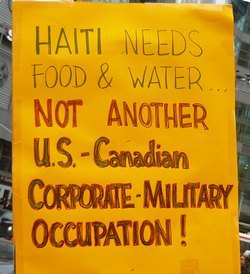
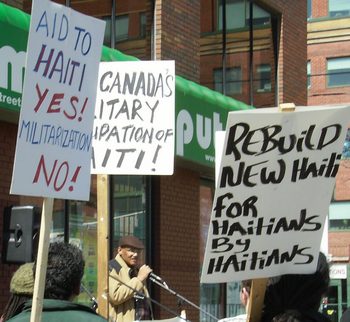
Protests in Canada following the earthquake in Haiti denounce the cynical use of the
humanitarian crisis by Canada, the U.S. and France for self-serving purposes.
On January 7, Ezili Danto, executive director of the Haitian Lawyers' Leadership Network, was interviewed on Vancouver Co-op Radio's Discussion. Danto gave an overview of the situation in Haiti and the important developments leading up to January 12, 2015, the five-year anniversary of the devastating 2010 earthquake and the date set for the dissolution of Haiti's lower house of parliament. The following excerpts from her interview describe the growing movement of the Haitian people to reclaim their independence and democracy from U.S. rule and its crucial tasks at this time. Danto explained that January 12, 2015 appears to be a point of convergence for the Haitian people in their struggle against the U.S.-imposed puppet presidency and military occupation and that 2015 brings the possibility of victories for Haiti in affirming its right to be.
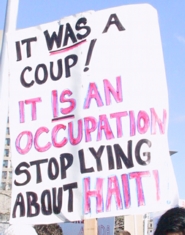 Danto described the U.S.
military occupation since the 2004
U.S.-Canadian-French coup against the elected President Jean-Bertrand
Aristide and
explained how the occupation used the 2010 earthquake to strengthen its
hold
on Haiti:
Danto described the U.S.
military occupation since the 2004
U.S.-Canadian-French coup against the elected President Jean-Bertrand
Aristide and
explained how the occupation used the 2010 earthquake to strengthen its
hold
on Haiti:
"Right now we have had a U.S. occupation in Haiti since 2004 -- direct U.S. occupation outsourced to the UN peacekeepers, in a country where there is less violence than the Dominican Republic, which is the other side of the island, in a country that has no war. The United States is in Haiti at the moment behind UN guns and NGO false benevolence. At the moment we are at this conjuncture, where on January 12, 2015 the Parliament of Haiti will dissolve. Michel Martelly, the puppet president [was] put in power by the U.S. in 2010, right after the earthquake. There was a big earthquake that happened in Haiti on January 12, 2010. Right after that earthquake, 316,000 Haitians were killed in less than a minute -- the greatest catastrophe the world has known in terms of numbers of people dead in that amount of time.
"It was at that time that the U.S.-led 'shock doctrine' forced the Haitians to go into elections, and the person that became president was a Compas singer named Michel Martelly, who was part of the Duvalierist cabal back in 1991. He was someone who worked with the army, someone who was right wing, probably someone who in normal times would not have been elected by Haitians. Literally, there was less than 17 per cent of the population voting, and within that 17 per cent of the population that was voting, a lot of the ballots were blanks. Hillary Clinton, who was at that point in time Secretary of State under Barack Obama, flew down to Haiti and basically said to the Parliament leader, 'You ratify this [election] or lose your Visas' and this has been going on ever since.
"Now we're in 2015. Since Martelly has come into power, he's basically acted as a dictator, with the UN as his guns, taking the place of the old Haitian bloody army, and has never held elections for Parliament. He got into power in May of 2011. Normally the Parliament is made up of 30 Senators and 99 Deputies in the lower house. There was a third of this, only 20 Senators, at the time that he got into power in May 2011. His first constitutional act should have been to hold elections for the other third of the Senate and for local offices and so forth.
"Since Michel Martelly has got into power in Haiti, there have not been any elections. The reasons why we wrote the piece that says what has to happen is to impeach Martelly, is that for the last three years people have been on the streets, protesting against Martelly in various ways; he's held four Carnivals, but no elections. He's spent money on Carnivals, he's spent money on flying to various places, promoting a lot of what the United States put him in office for -- which is a neo-liberal economy, where you privatize the public assets, and where you have an export economy, and development is tourism where you take fishermen's land and give it to the wealthy tourist. That's what he calls development.
"So we're at a point right now where there's going to be a dissolution of Parliament on January 12, 2015, because there has not been an election. There have been two lawyers in Haiti and others who have brought many corruption charges against the Martelly family. There's a judge that died under suspicious circumstances; there were, until last week, many political prisoners. So the people are asking for those things to happen.
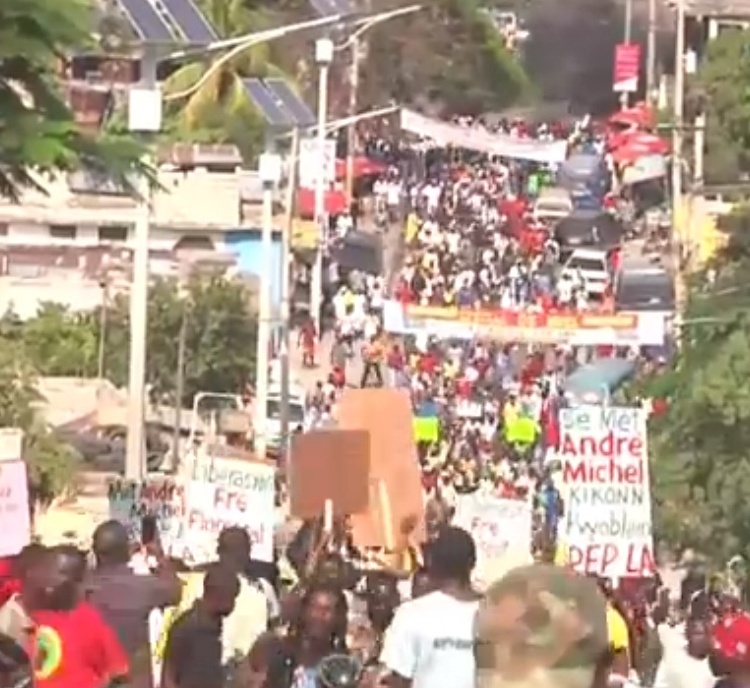 Demonstration calls for resignation of Prime Minister Lamothe and President Martelly, Port-au-Prince, December 13, 2014. |
"As of right now we have a situation where the Prime Minister of Haiti has resigned due to the pressure on the streets; today the Supreme Court Justice has resigned because of this stuff; and Martelly is faced right now with only 20 Senators: they are at this moment the only functioning, operating Parliamentary branch, because the Deputies, the 92 that are left, are out of session, and when they come back in session, all their terms will be over. There will not be any Parliament, it is about to be dissolved.
"For a lot of demonstrators who were on the streets, the Martelly government along with the U.S.-trained, Canadian-trained Haitian police have been doing what they are doing in Ferguson, Missouri. They have militarized police that they have trained -- Haitian police -- and they have been throwing foul water, tear gas and so forth, at students and those people protesting the Duvalierist-type dictatorship in Haiti that has been implanted by the international community, and the OAS and those that are doing this legitimizing of the elections to have a front that we have a democracy.
"What we said at the Haitian Lawyers' Leadership Network is that in order to avoid bloodshed and further unconstitutionality, the best thing for the Senate, which is the only legal authority that's left, is to impeach Martelly. We are under occupation, and all elections, we believe, are delegitimized, but the Senate is one of the only legal spaces in place where Haitians could say: 'Based on the Haitian Constitution, the people have taken a referendum, this illegal person, we want him out, we want the corruption gone.' We thought that in order to avoid the bloodshed, the best thing to do is for those 20 Senators to come together and impeach Martelly.
"But I think that the situation has gone way past that at the moment. We wrote this two weeks ago. The situation is moving very fast. At the moment we are told that there are U.S. Marines that have landed in Haiti yesterday. We don't know if they are there to keep Martelly in power, or if they're there to take him out on a plane to go the way that Duvalier went back in 1986."
Danto described the state of the popular forces in Haiti today and the demands of the movement of the people against the U.S occupation:
"[Jean-Bertrand Aristide] was the first democratically elected Haitian President. [Fanmi Lavalas] is his political party. But since 2004, when he was taken on a plane by U.S. special forces and deported back to Africa, the Fanmi Lavalas political party has not been allowed to go for elections. President Aristide returned to Haiti seven years after the coup d'etat of 2004. Haiti has a very politicized people; they are very participatory about what is going on in their country. The reason that we have this sort of convergence of things happening -- this pushing of Martelly and Lamothe to resign to the point where the resignation is close -- is because of the popular movement. And that popular movement includes what is generally known as the Lavalas Movement, which is larger than the political party of President Aristide. It is the entirety of pro-democracy folks in Haiti, who may come from different points of view, but who are about not having dictatorship and institutionalizing the rule of law.
"[Senator Moïse Jean-Charles] is one of the most vocal folks who are leading the people on the streets right now to talk about a couple of things.
"What they are asking for is the resignation of the puppet government of Haiti, for the MINUSTAH, the UN 'peacekeeping' force in Haiti, to leave -- they're the military arm of the U.S. occupation -- and they're asking for the NGOs to leave. [The NGOs have] been in Haiti for decades and we've still had zero growth, zero infrastructure for public health and so forth and so on, because they do not have any accountability to the public, only to their various memberships, and those memberships are located overseas. It is the new way that, post-Cold War, the United States controls the internal affairs of different countries, by destroying the infrastructure and then by making the country dependent by bringing in charity as the new infrastructure. That charity is discriminatory because who that charity supports will be people who are more right wing, more about supporting U.S. imperialism... Folks don't quite understand that the NGOs are very politicized because they're funded by governments who are funding them for a particular reason.
"The Fanmi Lavalas movement is very, very powerful -- it is one of the most powerful political movements. It is the most powerful political party if they were allowed to run in the elections today. It's more than likely, unless they put up someone ridiculous, that they will win, because of the struggle that the Haitian people have had with regards to President Aristide. But there are very new and dynamic young lawyers and people who have distinguished themselves in the last ten years outside of the Fanmi Lavalas party, because the party was forbidden to run in elections.
"We at the Haitian Lawyers' Leadership Network see and have explained to folks around the world that MINUSTAH, the UN Chapter 7 peace enforcement force that has been in Haiti for seven years has left us with no development, and lots of human rights abuses, including bringing cholera to us in October 2010. This has killed over 10,000 poor Haitians, and has infected all of our waterways and over 850,000 Haitians. That's what the UN humanitarians have brought us. And this is after the earthquake and the amazing trauma of that. We are at a conjuncture right now, a convergence, where on January 12, 2015, it will mark the fifth year anniversary of the earthquake, and the dissolution of the parliament. Because of all of that... we see, finally, opportunity maybe to push to get rid of MINUSTAH, to try to get our sovereignty back, and everybody's pushing towards that right now."
Danto's appraisal is that events point to a strong possibility of a breakthrough for Haitians in their fight for empowerment and a patriotic government:
"Of course, it's always ominous when U.S. forces land in Haiti, and we are at this juncture. So many people have already died in the last 10 years fighting to get to this point. But, I'll give you an example: there are two young lawyers, André Michel and Newton St-Juste, and this is interesting because they are asking Bill Clinton to account for the $10 billion that was collected from 2010. For 18 months he was a co-chair of the Interim Haiti Recovery Commission. And that's very exciting, because for the first time we're looking outward. It's not an internal fight, it's 'here are our traditional enemies, here is what they're doing.' It's clearer now, whereas before we didn't really have that. I think that's very interesting that we have this sort of convergence happening. Right now, January 12 is coming. Lots of media only come to Haiti once a year, when the earthquake anniversary comes along, to do these little feel-good stories, but one of the big stories is what happened to the money, to that $10 billion.
"These two young Haitian lawyers... have been able to get many Haitians out of jail in the last three weeks because of the uprising of the people. People were going to the streets, and the U.S. occupational forces, led by the Martelly government, would arrest them and throw them in prison. Martelly has been ruling by decree since he got in. The international community ignored it, and emboldened it. But today, the forces of all this media are coming in from all over the world, coming to talk about what happened -- it's the fifth anniversary: what has been done, how many people are still on the streets, how much housing, where has the money gone, what's going on with jobs and so forth. We have that conjuncture, we have the UN Security Council coming to Haiti on January 23 [to evaluate MINUSTAH], so you have all this happening, and at the same time you have these young Haitians who are in the streets almost every day.
"I see that this group of Haitians are much more knowledgeable about what the export economy is all about, how it destroys the local economy; they're much more cognizant that with the NGOs, 99 cents of every dollar they collect goes back to them, only one cent goes to the Haitian government. They understand all of that. They don't want that kind of aid, they don't want them there. I think that's a new thing and I hope that it continues, I hope that the United States doesn't brutally silence these people with death. I think I see a change. We hope not too many more people die. We hope that it's not a bloodbath coming up in the next three weeks."
All Out to Support
the Haitian People's Fight to
Reclaim Their
Independence and Democracy!
(Interview edited for clarity and length. Photos: TML, RT.)
Steadfast Defender of Puerto Rico's Right to Independence
Worldwide
Campaign
for
Liberation
of
U.S. Political Prisoner Oscar López Rivera
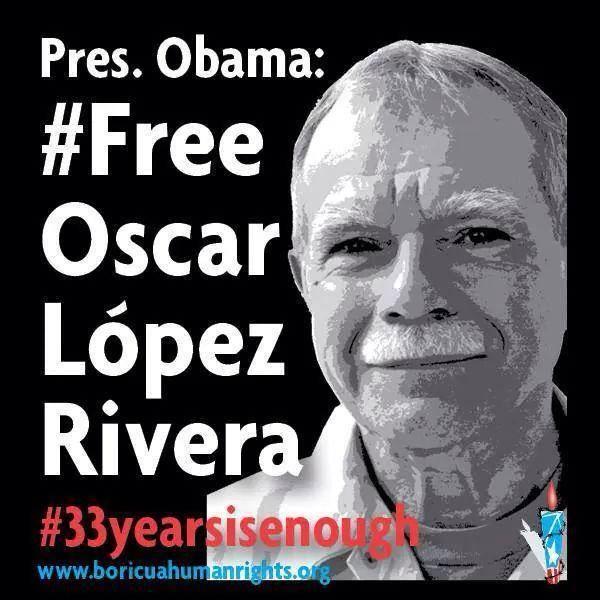 A worldwide campaign for the
release of Puerto
Rican patriot and political prisoner Oscar López Rivera is
underway. Unjustly sentenced to 55 years in prison by the U.S.
colonial power for his just and principled stands to defend the
dignity and sovereignty of the Puerto Rican people, López Rivera
has been imprisoned for nearly 34 years, 12 of them in solitary
confinement. He has held to these positions in the face of this
hardship while at the same time being a model prisoner. This
steadfastness and fidelity to the cause of the Puerto Rican
people has been recognized throughout Latin America, the
Caribbean, the U.S. and around the world by all the forces who
are fighting for dignity, justice and independence and against
U.S. imperialism.
A worldwide campaign for the
release of Puerto
Rican patriot and political prisoner Oscar López Rivera is
underway. Unjustly sentenced to 55 years in prison by the U.S.
colonial power for his just and principled stands to defend the
dignity and sovereignty of the Puerto Rican people, López Rivera
has been imprisoned for nearly 34 years, 12 of them in solitary
confinement. He has held to these positions in the face of this
hardship while at the same time being a model prisoner. This
steadfastness and fidelity to the cause of the Puerto Rican
people has been recognized throughout Latin America, the
Caribbean, the U.S. and around the world by all the forces who
are fighting for dignity, justice and independence and against
U.S. imperialism.
Uruguayan President José Mujica, in an open letter to U.S. President Barack Obama sent in early December 2014, highlighted significant cases of unjust imprisonment by the U.S., including López Rivera. A former guerilla, Mujica himself spent 13 years as a political prisoner. This letter led to negotiations with the U.S. for the release of López Rivera, which are ongoing. On December 24, Marcia Rivera, a prominent academic and relative of López Rivera who lives in Uruguay, announced through her Facebook account that the liberation of the activist could come very soon. Also that day, Puerto Rican Governor Alejandro Garcia Padilla said his government is also urging the U.S. to free the political activist.
On January 4, Venezuelan President Nicolas Maduro offered to send the U.S. imprisoned opposition leader Leopoldo López in exchange for the freedom of López Rivera. Leopoldo López was arrested in February after he helped launch a three-month wave of violent opposition demonstrations seeking Maduro's ouster. This offer was a response to remarks by U.S. Vice President Joe Biden to Maduro on January 4 that the release of those Biden termed "Venezuelan political prisoners" would be a prerequisite for any thaw in relations between the two countries. During a televised speech later that day, President Maduro said that "the only way I would use my presidential powers [to release Mr. López] would be to put him on a plane to the United States, to leave him there, and that they hand over Oscar López Rivera -- man for man." U.S. state department spokeswoman Jen Psaki said on January 7 that the cases of Leopoldo López and López Rivera are not comparable, effectively rejecting the offer.
The president of the Committee for Human Rights in Puerto Rico, Eduardo Villanueva, in a January 5 Inter News Service item, said that the past year has been very productive in the struggle for the liberation of López Rivera. He noted that last year, several national political figures were allowed to visit López Rivera in prison in Terre Haute, Indiana. These included Alejandro García Padilla of the Popular Democratic Party; Senator Maria de Lourdes Santiago of the Puerto Rican Independence Party, along with the party's General Secretary Juan Dalmau; the leaders of the National Hostos Independence Movement, Alejandro Torres Rivera and Wilma Reveron; and the Rev. Rafael Moreno of the Council of Churches.
He stressed the importance of international pronouncements in recent times by political leaders such as presidents Daniel Ortega of Nicaragua; Raúl Castro of Cuba; José Mujica of Uruguay, plus Nicolas Maduro and the late Hugo Chávez; and former Spanish judge Baltasar Garzón. He also noted pronouncements by the Community of Latin American and Caribbean States (CELAC), the International Social Forum in São Paolo and the Permanent Conference of Political Parties of Latin America and the Caribbean. "This has increased the pressure on the Obama administration which knows it has to be consistent in what it says about human rights," said Villanueva.
January 6 marked López Rivera's 72nd birthday. The National Boricua Human Rights Network and La Respuesta Magazine organized a worldwide campaign to call for his freedom. The campaign, "Birth of a Patriot, Star of a Nation," called for 100,000 messages to the official twitter accounts of U.S. President Barack Obama, the White House and U.S. Justice Department. The Network reports that the campaign reached 500,000 people. Meanwhile, A vibrant celebration was held in Puerto Rico to mark his birthday, where many speakers highlighted how López Rivera is an inspiration to them and an exemplar of the revolutionary spirit of the Puerto Rican people. January 6 is also "Three Kings Day" or the twelfth day of Christmas, and in Puerto Rico the day's celebrations were dedicated to the freedom of López Rivera.
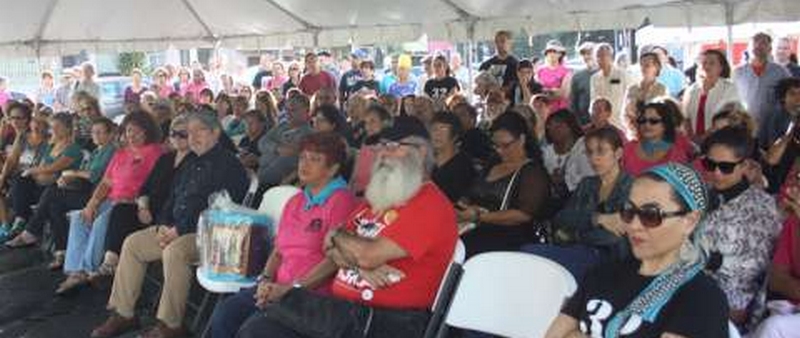
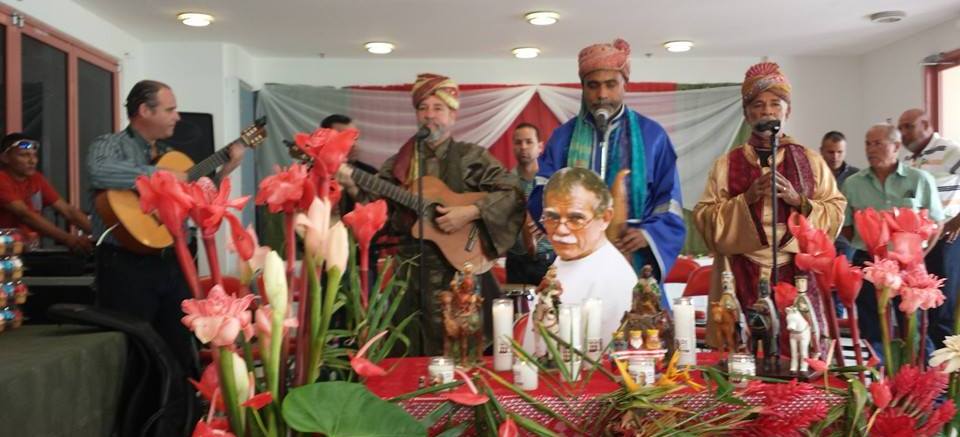
Top: Celebration of Oscar López Rivera's 72nd birthday in San Juan, Puerto Rico,
January 6, 2015. Bottom: Three Kings event in San Juan.
Many cultural, religious and political personalities are demanding the immediate release of López Rivera. In a December 12, 2014 item for CounterPunch, Matt Peppe, points out some of these:
"[In early December] at a concert in San Juan, reggaeton singer René Pérez Joglar of the band Calle 13 brought López's daughter Clarissa on stage to read a letter pleading for her father's release.
"After winning the silver medal in judo in the Central American and Caribbean games in November, Augusto Miranda told the press: 'I want to use this forum for all the people of Puerto Rico and the United States. It's an abuse what they've done to Oscar López Rivera, political prisoner. It's time to give him his freedom.'
"The President of the Universidad de Puerto Rico (UPR), Uroyoán Ramón Emeterio Walker, joined with students at the university to call for López's release, citing 'humanitarian reasons' for what Emeterio called a 'disproportionate' sentence.
"Human rights activists such as Nobel Peace Laureates Archbishop Desmond Tutu, Máiread Corrigan Maguire and Adolfo Pérez Esquivel have called on Obama to release López. [...] Tutu has said that López's 'crime' was 'conspiracy to free his people from the shackles of imperial justice.'"
In related news, fellow Puerto Rican political prisoner Norberto Gonzalez Claudio is expected to be released from a U.S. prison on January 15. Given a five-year sentence in 2011, he was originally scheduled for release on September 7, 2014.
TML Weekly reiterates the demand for the U.S. to immediately free Oscar López Rivera and to end its colonial domination of the nation of Puerto Rico.
(With files from teleSUR, BBC, Inter News Service, PanAm Post. Photos: El Nuevo Dia, National Boricua Human Rights Network)
Oscar López Rivera,
Puerto Rican Independence Fighter
Born in 1943 in Puerto Rico, Oscar López Rivera was a decorated veteran who received a medal for combat for fighting in the Vietnam War. After returning to Chicago where his family lived, he joined the struggle in the defence of Puerto Rican rights. He was a well-known community organizer who attempted to improve living conditions in his community. He participated in acts of civil disobedience and peaceful militancy.
In 1976, he joined the underground struggle for the independence of Puerto Rico as a member of the National Liberation Armed Forces (FALN).
In 1981, he was captured by the FBI on charges of "seditious conspiracy" and for belonging to the FALN. When he was captured he declared himself a "political prisoner," exercising his right under the First Protocol of the Geneva Convention of 1949, which recognizes this right for people detained in the context of colonial occupation.
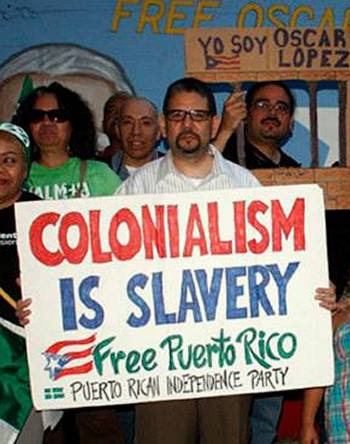 According to the protocol,
a prisoner of war cannot be
judged as a
common criminal, much less if the cause of such procedure rests in acts
relating to participating in anti-colonial struggle. The claim was
ignored by the
U.S. government, which sentenced López Rivera to 55 years in
federal prison.
After
accusing the imprisoned Puerto Rican activist of attempting to flee
("conspiracy to escape"), the authorities extended his sentence to 70
years, 12
of which López Rivera has spent in total solitary confinement.
According to the protocol,
a prisoner of war cannot be
judged as a
common criminal, much less if the cause of such procedure rests in acts
relating to participating in anti-colonial struggle. The claim was
ignored by the
U.S. government, which sentenced López Rivera to 55 years in
federal prison.
After
accusing the imprisoned Puerto Rican activist of attempting to flee
("conspiracy to escape"), the authorities extended his sentence to 70
years, 12
of which López Rivera has spent in total solitary confinement.
May 2014 marked the 33rd year in prison for López Rivera. He is the last remaining of the 13 imprisoned FALN militants. Former U.S. President Bill Clinton offered a conditional pardon in 1999 to the rest of the 13 FALN members, but López Rivera refused out of solidarity because the condition for his release included 10 more years in prison, a deal not offered to two of his other comrades.
"We had no other alternative to survive as a people. We are talking about a moment of great persecution and repression, and we wanted to survive. We used what they call 'armed propaganda' to carry the message of our struggle," said López Rivera.
But he maintains that he has no regrets. "In my experience, the first 18 years in prison have been terrible, so I thought that it would be impossible to be released on good behaviour after everything they've done to me," he added.
On June 18, 2012, the United Nations Committee on Decolonization approved a resolution promoted by Cuba calling for recognition of the right of independence and self-determination of Puerto Rico. It also urged the U.S. to release the imprisoned independence fighters. The draft was supported by Bolivia, Ecuador, Nicaragua and Venezuela, and was passed by the committee by consensus. The U.S. disregarded the UN resolution.
The Mandela of These Times?
The cause for freeing Oscar López Rivera has been celebrated and supported by artists Calle 13, Andy Montañez, Ricky Martin, Chucho Avellanet, the filmmaker Jacobo Morales, intellectuals, and world leaders in social and political movements.
Advocates for López Rivera compare his case to former South African President Nelson Mandela, who was imprisoned by a government that he considered illegitimate.
Recently, Venezuelan president Nicolas Maduro paid homage to López Rivera.
"He has been in jail for 35 years. He is the Mandela of these times. His only crime was wanting an independent Puerto Rico ... He has been subject to ridicule, but he is the Latin American Mandela," Maduro said when he was leaving the UN Climate Change Summit which took place in New York.
The Venezuelan leader urged the U.S. to free this independence fighter whose only crime was "defending the star of dignity on the flag of our sister Puerto Rico."
(TeleSUR, December 24, 2014)
Read The Marxist-Leninist Daily
Website: www.cpcml.ca
Email: editor@cpcml.ca
 The book, The
Production and Reproduction of Value and Its
Realization by K.C. Adams will be published soon. It elaborates
human-centred economic theory as an alternative to capital-centred
economic theory by presenting the modern terms, expressions and
approach
used by the Communist Party of Canada (Marxist-Leninist). The book is
an
important contribution to the work to change the direction of the
economy
and usher in the new. For instance, to wage the ideological struggle
against
the neo-liberal defeatist world outlook when analyzing economic
developments
or writing economic articles, it is of utmost importance to oppose
imperialist
and capital-centred theory and its terms and expressions.
The book, The
Production and Reproduction of Value and Its
Realization by K.C. Adams will be published soon. It elaborates
human-centred economic theory as an alternative to capital-centred
economic theory by presenting the modern terms, expressions and
approach
used by the Communist Party of Canada (Marxist-Leninist). The book is
an
important contribution to the work to change the direction of the
economy
and usher in the new. For instance, to wage the ideological struggle
against
the neo-liberal defeatist world outlook when analyzing economic
developments
or writing economic articles, it is of utmost importance to oppose
imperialist
and capital-centred theory and its terms and expressions. The terminology based on
capital was necessary to
explain the new
political economy of capital in contrast to pre-capitalist economic
formations,
in particular feudal relations of production. This theory was developed
to meet
the requirements of the working class in its nascent form. As the
working class
matured and became capable as a social force to move society to
socialism
past the transitional economic formation of capitalism, it became
necessary to
develop a new human-centred political economy.
The terminology based on
capital was necessary to
explain the new
political economy of capital in contrast to pre-capitalist economic
formations,
in particular feudal relations of production. This theory was developed
to meet
the requirements of the working class in its nascent form. As the
working class
matured and became capable as a social force to move society to
socialism
past the transitional economic formation of capitalism, it became
necessary to
develop a new human-centred political economy. The working class is now
charged with the responsibility
to develop its
theory consistent with the need of the working class to assume its
central and
leading political, economic and social position in society. In the
economic
terms that have been developed to date, which are referred to as
human-centred political economy, means of production are not fixed
capital
and certainly not fixed costs but fixed transferred-value.
The working class is now
charged with the responsibility
to develop its
theory consistent with the need of the working class to assume its
central and
leading political, economic and social position in society. In the
economic
terms that have been developed to date, which are referred to as
human-centred political economy, means of production are not fixed
capital
and certainly not fixed costs but fixed transferred-value.
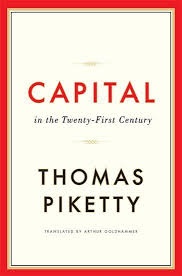 This "Pikettymania" is not
reserved for the monopoly media. Piketty has
also been received by Obama's advisers and given standing by at least
two
Nobel Prize winners, Paul Krugman and Joseph Stiglitz. He outlined his
thesis
via Skype to Bill Gates, AFP also reports.
This "Pikettymania" is not
reserved for the monopoly media. Piketty has
also been received by Obama's advisers and given standing by at least
two
Nobel Prize winners, Paul Krugman and Joseph Stiglitz. He outlined his
thesis
via Skype to Bill Gates, AFP also reports. The world is in the period
of the retreat of revolution. That is no reason
to go crazy unconcerned and abandon our forebears who gave us so much
in
the practice and theory of revolution. Just like them during the
previous period
of the flow of revolution, it is up to us to analyze the objective
conditions
calmly and mobilize the working class to defend its rights and organize
for an
alternative that favours the people. It brings nobody honour to run
after the
latest bourgeois fad in political and economic affairs.
The world is in the period
of the retreat of revolution. That is no reason
to go crazy unconcerned and abandon our forebears who gave us so much
in
the practice and theory of revolution. Just like them during the
previous period
of the flow of revolution, it is up to us to analyze the objective
conditions
calmly and mobilize the working class to defend its rights and organize
for an
alternative that favours the people. It brings nobody honour to run
after the
latest bourgeois fad in political and economic affairs.